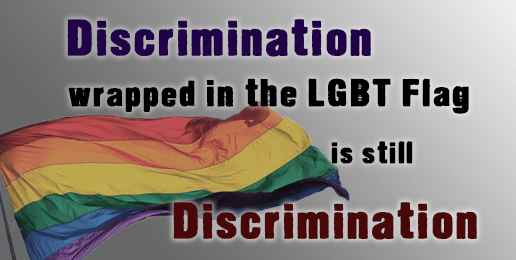
Written by Joseph Backholm
If we’ve heard it once, we’ve heard it a million times. Discrimination is bad and people who do it should be publicly scorned. I get it.
But what exactly does it mean to say you don’t discriminate?
Do you eat every time you have the opportunity? Do you believe everything you’re told? Do you hire everyone who applies for a job and assign positions randomly so as to not discriminate against the incompetent?
The reality is, we all discriminate and we all know it. There is no law banning discrimination generally or else seven year-olds would be buying hand guns and blind people would get driver’s licenses.
Non-discrimination laws are themselves discriminatory because they forbid certain choices and many forms of discrimination are downright healthy. No, felon, you cannot babysit my children.
We failed to clarify that our war on “discrimination” was actually a war on a specific kind of discrimination and in doing so we failed to reinforce the idea that some discrimination is like music; sometimes it’s good and sometimes it’s very, very bad.
Today’s social engineers have taken advantage of our failure to define the terms by framing many of their attempts to control us as fighting discrimination. This allows them to self-righteously dismiss those who might critique their policies as supporters of discrimination.
The results are both dishonest and bizarre.
Last week, Washington State said that Catholic hospitals can’t contract with the local hospital district because they “discriminate” by not performing abortions. However, their objection to discrimination in this context is, as always, a one-way street. If you want to give a baby life, Planned Parenthood has nothing for you, but they still get $25 million a year from Washington State government and over $300 million from the federal government.
Essentially, it’s ok to discriminate in the kind of maternity services you provide so long as you do it in a way they like.
A naked guy (who now says he’s a girl) in Olympia, WA has been walking around the women’s locker room at Evergreen State College in his anatomically male birthday suit in front of children as young as six years-old. Evergreen has taken the position that preventing him from doing so would be discrimination based on “gender expression”, which is a protected status under the law prohibiting discrimination based on sexual orientation.
That same non-discrimination law is being used to sue Arlene’s Flowers, a florist in Richland, Washington who chose not to perform floral services for a same-sex wedding.
So, as applied, one law simultaneously requires young girls to be with naked men in the women’s locker room but forbids small businesses from declining to be part of a celebration they personally disagree with.
In a similar case, the New Mexico Supreme Court said that their non-discrimination law allows a $6,600 fine to be assessed against a photographer who declined to take pictures of a same-sex commitment ceremony. This, in the words of the court, is the “price of citizenship.”
Perhaps government just doesn’t support the conscience rights of business owners anymore.
It turns out that’s not totally true either.
Seattle Mayor Mike McGinn, who is no right-winger, has suddenly come storming to defense of business owners. He recently told FoxNews that “We have businesses that are stepping up, that are setting forth what their values are. And again, they have rights too. And they have a right to not invite people onto their premises…” Sounds like a victory for florists and wedding photographers everywhere, right?
Except it’s not.
He wasn’t defending the rights of people whose values reflect a natural understanding of marriage, but businesses owners who don’t want to do business with people who carry guns. I have no reason to believe Mayor McGinn would be nearly as supportive of the right of a business owner to set forth their values in the context of marriage.
Of course declining to do business with someone for any reason is “discrimination” but so is telling a business owner they have to do business with someone. In years gone by, that was also called slavery. Regardless, the arbitrary way that politicians are defending the rights of business owners is a great example of how “discrimination” is bad only when it allows someone to make a choice I disagree with.
The current strategy of “discriminating to end discrimination” is creating policy that is just as confused as the strategy would suggest.
Perhaps it is time we actually start thinking about the policy we’re creating and balance our desire for a world in which people treat each other kindly with other values as well; values like protecting the innocence of our children, freedom of thought, freedom of expression, freedom of association, religious liberty and the rights of the individual. Things that we used to value back before we launched a well-intentioned but undefined war on discrimination based on this newfound right not to have your feelings hurt.
In the end, I’ll likely conclude that people should have the freedom to turn away customers who carry guns, but in doing so I will probably also discover that it’s not the end of the world if people have the freedom to do things I wouldn’t do.
Or we could continue down the current path, where businesses become slaves to their customers and we’re forced to explain to our little girls why there are naked men in the women’s locker room-all in the name of not discriminating.
Joseph Backholm has served as the director of the Family Policy Institute of Washington (FPIW) for three years. He received his Bachelors from the University of Washington and his law degree from Seattle University. Born and raised in Aberdeen, Washington, Joseph and his wife live with their three daughters and one son in Washington.
This article first appeared at the FPIW’s blog. You can see the original article and comments HERE.























